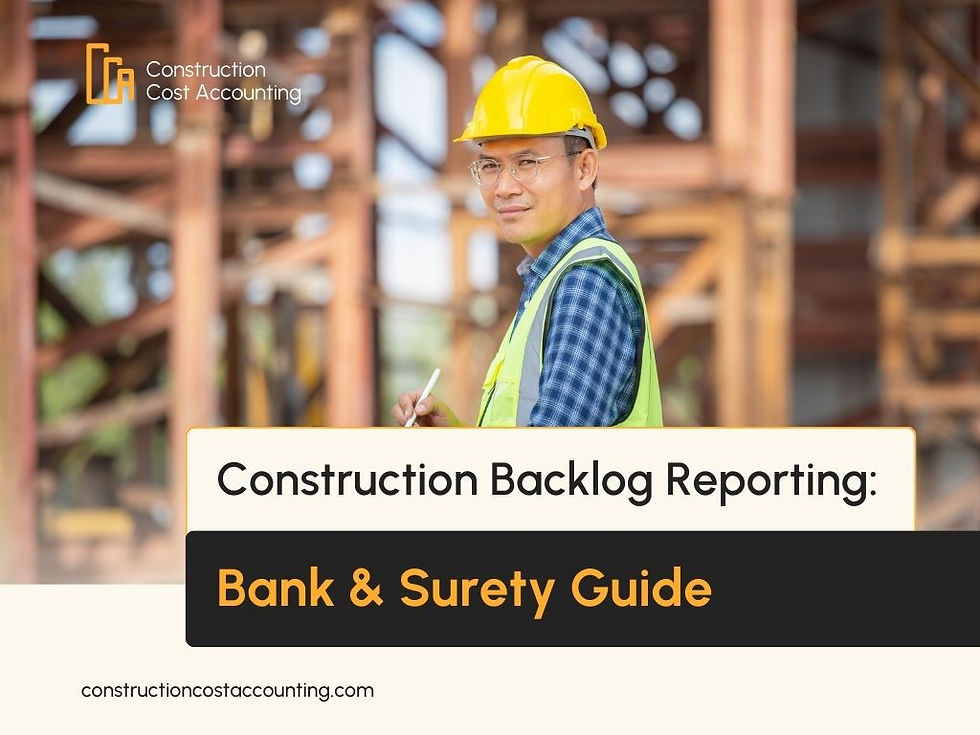What Is Underbill? What Makes Contractor Underbill On Their Projects?
- Cost Construction Accounting

- Apr 8, 2020
- 3 min read
Updated: Oct 16, 2025
In the world of Percentage of Completion (POC) Project Accounting, two critical terms often dictate a contractor's financial health: overbilling and underbilling. While overbilling may signal potential risks, underbilling is often the silent culprit, slowly eroding cash flow and distorting the true profitability of your projects.
For Small to Mid-Sized Contractors (SMEs), chronic underbilling reflects flaws in project accounting, turning earned revenue into cash you can’t access. This can significantly impact your financial operations and hinder business growth.

In this article:
What is Underbilling?
Underbilling occurs when the Value of Work Completed (the revenue you’ve earned) exceeds the total amount Invoiced (the revenue billed) to the customer up to that point. In simpler terms, you've completed more work than you've billed for.
For Example:
If your team completes 45% of a project, but you only invoice 30% of the contract value, you’ve underbilled by 15%. This 15% represents earned revenue that is still sitting as an asset on your books (Costs and Estimated Earnings in Excess of Billings) instead of being available in your bank account.
Why Do Contractors Underbill? 4 Critical Causes
Underbilling is rarely intentional. It's usually the result of a breakdown in your field operations, project management, or accounting systems. Here are the four most common reasons:
1. Poor Billing Cutoff Management
Many contractors have a fixed invoice date (e.g., the 1st of the month), but their cost cutoff date (the final day for measuring work completed) is several days earlier (e.g., the 25th). As a result, any labor, materials, or services completed between the cutoff date and the invoice date will be excluded from the current bill, creating temporary underbilling.
How to Resolve: Align your internal cost tracking and progress reporting with your customer’s billing cycle as closely as possible. Using real-time tracking technology will help ensure your invoices reflect the most up-to-date percentage of completion.
2. Ignoring Unsigned or Unapproved Change Orders
This is one of the most significant causes of permanent underbilling. Change Orders (COs) are common, but if you complete work before receiving approval or a signed CO from the customer, you risk performing extra work without securing the corresponding revenue.
How to Resolve: No work proceeds on a change order without signed approval. Track COs from initiation to final billing in a dedicated system to ensure accurate billing and avoid unnecessary underbilling.
3. Inaccurate Cost-to-Complete Tracking
In POC accounting, the amount you bill is directly tied to your costs and your estimated Cost-to-Complete (CTC). If your accounting team doesn’t have updated bills from vendors and subcontractors, your Job Costing reports will be incomplete, leading to conservative estimates and underbilling.
How to Resolve: Integrate your Accounts Payable (AP) system with your Job Costing software to ensure real-time tracking of committed costs, even if the invoices haven’t been fully processed yet. This will give you the most accurate picture of the project’s financial status.
4. Misaligned Cash Flow vs. Revenue Recognition
This issue arises when you pay subcontractors for work before it is complete and billable to the owner. Paying a subcontractor for an incomplete phase creates temporary underbilling because you’ve paid for costs you can’t yet invoice.
How to Resolve Negotiate payment terms with subcontractors that align with your billing milestones. This ensures you can invoice the customer for completed work before your cash obligation to the subcontractor is due.
Conclusion: Tame Your Costs, Stop the Leak
Underbilling is a serious warning sign. It signifies a disconnect in your accounting process that jeopardizes cash flow, distorts your financial statements, and restricts your growth potential. By implementing standardized, accurate accounting and management processes, you can transform your financial operations and avoid long-term financial pitfalls.
Don’t let poor accounting turn earned revenue into permanent loss.
Ready to Tame Your Job Costs and Fix Your Underbilling Issues?
At Construction Cost Accounting (CCA), we provide specialized outsourced accounting, bookkeeping, Accounts Payable, Job Costing, WIP analytics, Sage Accounting, QuickBooks specifically for construction industry. Our expertise helps you move from reactive accounting to proactive financial management.
Stop guessing your profitability and start billing accurately. Book your 30-minute free consultation today to discuss a customized solution for your business




Comments